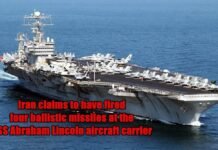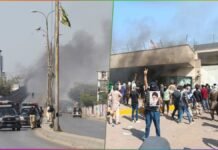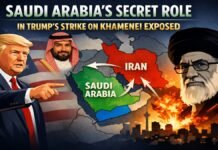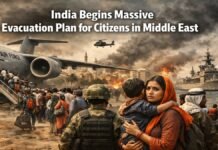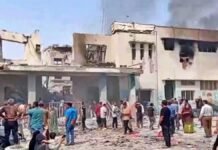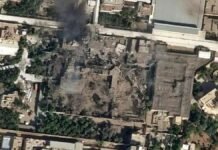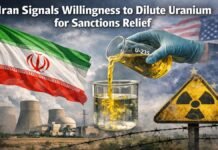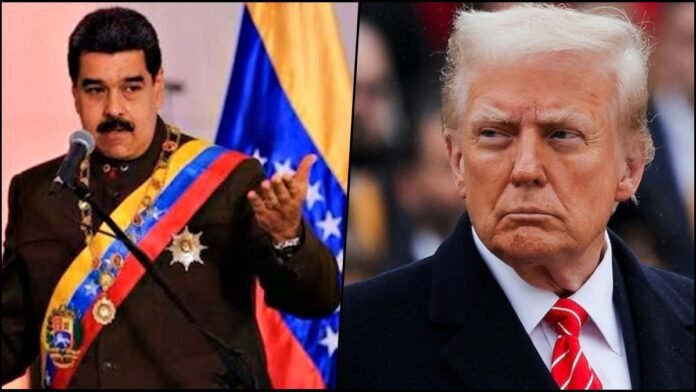
Key Points:
- Venezuelan President Nicolás Maduro announced deployment of 5,000 Russian-made Igla-S anti-aircraft missiles at strategic defense positions on October 22, 2025
- President Trump authorized CIA covert operations in Venezuela on October 15, marking significant escalation in bilateral tensions
- US has deployed approximately 10,000 troops, 8 naval vessels, submarine, and B-1 supersonic bombers to Caribbean region
- At least 37 people killed across 9 US airstrikes on alleged drug trafficking boats since September 1, 2025
- Trump administration preparing land strike options after announcing intentions to bomb targets inside Venezuela on October 21
- Maduro claims militia mobilization of 8 million members; experts question accuracy and training quality
- Venezuela filed complaint at UN Security Council calling US actions “extrajudicial killings” and charter violations
New Delhi: Venezuelan President Nicolás Maduro publicly declared on October 22, 2025, that his country has strategically positioned 5,000 Russian-manufactured Igla-S man-portable air defense systems across the nation’s territory. During a televised military broadcast, Maduro emphasized that “every military force in the world knows the power of the Igla-S” and warned that these systems have been deployed “from every mountain, village, and city across our territory”. The lightweight, shoulder-fired missiles are comparable to American Stinger systems and can engage low-altitude aircraft, helicopters, cruise missiles, and drones at ranges up to 6 kilometers and altitudes reaching 3,500 meters. While the exact number of missiles has not been independently verified, defense experts confirm that Venezuela has maintained military cooperation with Russia for years, including previous purchases of air defense systems.
Trump’s Escalating Military Strategy
President Donald Trump has dramatically intensified pressure on the Maduro regime through a multi-pronged military and intelligence approach. On October 15, 2025, Trump secretly authorized the CIA to conduct covert operations inside Venezuela, marking the most significant intelligence escalation in the region in years. The presidential finding, crafted by Secretary of State Marco Rubio with input from CIA Director John Ratcliffe, specifically targets displacing Maduro from power. On October 21, Trump announced his administration would notify Congress of intentions to bomb targets within Venezuelan territory, expanding operations beyond maritime strikes. “We are definitely considering land options now, as we have the sea well under control,” Trump told reporters.
The US military presence in the Caribbean has swelled to approximately 10,000 personnel, including 4,500 Marines and sailors aboard amphibious assault ships, with 8 Navy surface vessels, a submarine, and supersonic B-1 bombers positioned near Venezuelan waters. Defense experts have characterized this deployment as “21st-century gunboat diplomacy” designed to establish a credible threat of regime change. Defense Secretary Pete Hegseth confirmed that military operations against alleged drug cartels would continue and potentially expand to land-based targets.
Deadly Maritime Strikes
Since September 1, 2025, US forces have conducted at least nine lethal airstrikes on vessels in Caribbean and Pacific waters, resulting in 37 confirmed deaths and two captures. Trump released video footage of the first strike on September 2, which killed 11 people aboard a boat allegedly departing from Venezuela. The administration claims these vessels were operated by members of the Colombian National Liberation Army guerrilla group and Venezuelan criminal organization Tren de Aragua, though no public evidence has been presented. Seven strikes occurred in the Caribbean and two in the Pacific, with the US asserting that operations take place in international waters against narco-terrorist networks.
Legal experts and lawmakers from both parties have questioned the constitutionality and international legality of these extrajudicial killings. Colombia and Venezuela have formally accused the United States of murder under international law. Venezuela filed a complaint with the UN Security Council on October 9, calling the strikes “extrajudicial killings” and “grave violations of the UN charter”.
Maduro’s Counter-Strategy
In response to mounting US pressure, Maduro has mobilized Venezuela’s defense infrastructure and activated what he claims are 8 million volunteer militia members. During a televised address, Maduro proclaimed that the Venezuelan people are “clear, united, and aware” and possess the ability to “once again thwart this overt conspiracy against the peace and stability of Venezuela”. However, military analysts have expressed skepticism regarding both the accuracy of the militia membership figures and the quality of training these volunteer forces have received.
Maduro has consistently accused the Trump administration of orchestrating regime change under the pretext of counter-narcotics operations, alleging the true objective is to seize Venezuela’s oil resources. The Venezuelan leader has called US actions an “open conspiracy” and warned against what he termed a “crazy war” with the United States.
Trump Administration’s Rationale
The Trump administration has framed its military posture as essential for combating drug trafficking and protecting US national security amid rising overdose deaths. Trump has labeled Maduro “one of the largest narco-traffickers in the world” and offered a $50 million reward for information leading to his arrest based on 2020 drug trafficking indictments. The administration has designated the alleged “Cartel de los Soles,” named after the sun insignia worn by Venezuelan generals, as a Specially Designated Global Terrorist organization, claiming it provides material support to the Sinaloa Cartel and Tren de Aragua.
However, experts note that the surge in US overdose deaths is predominantly linked to fentanyl from Mexico rather than cocaine from South America, raising questions about the strategic justification for targeting Venezuela specifically. Trump reportedly seeks to pressure Maduro into voluntarily relinquishing power by establishing a credible military threat, rather than immediately executing strikes against the Venezuelan leader himself.
Regional and International Impact
The escalating conflict has generated significant anxiety throughout Latin America and the Caribbean. Many Venezuelans express greater concern about economic survival than military confrontation, with inflation and currency instability dominating daily life. Colombia has been particularly affected, as some US strikes have targeted Colombian nationals and waters near its territorial boundaries.
International observers warn that regime change efforts carry substantial risks, including potential civil conflict, refugee crises, and power vacuums that criminal organizations could exploit. The Crisis Group cautioned that “a crescendo of steadily more invasive missile strikes likely hitting targets on land in Venezuela or even special force operations against senior officials or military commanders, could ensue” if naval pressure alone fails to dislodge Maduro. Despite Trump’s aggressive posture, no final decision has been made to directly target the Venezuelan president or conduct full-scale military intervention.




